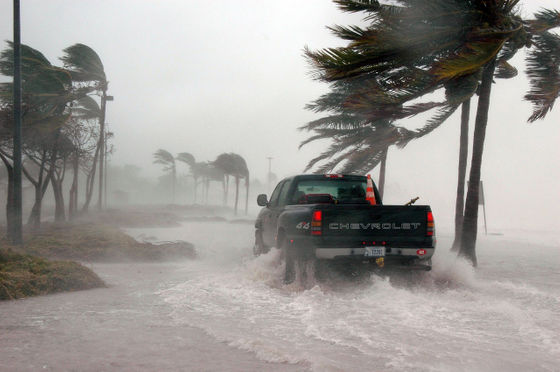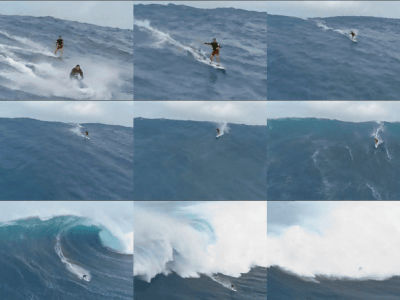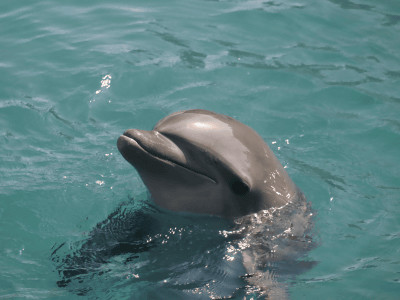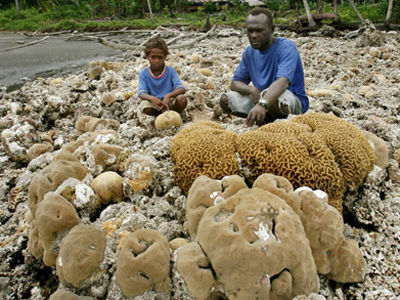What happens to fish and sea creatures during a hurricane?

When a powerful hurricane makes landfall, it causes visible damage such as collapsed houses and fallen trees, but it is rare to see the impact on the ocean. Science news site ScienceAlert has explained the effects of severe storms on sea creatures, based on experts and previously reported cases.
What Happens to Animals in The Ocean During a Hurricane? : ScienceAlert
According to Melissa May, who teaches marine biology at Florida Gulf Coast University, the impact that hurricanes have on fish, dolphins, etc. varies greatly depending on the scale and location.
Hurricanes bring about a storm surge, which is a rise in sea level, but in the ocean, the effect is nothing more than an ``unusual high tide,'' and there are cases where it does not particularly affect living things. On the other hand, in some cases, it can cause fatal environmental changes such as changes in salinity or the kicking up of sediment from the ocean floor, with the effects sometimes extending to the ocean floor as deep as 300 feet (approximately 91 meters). .

During rough seas, many fish and marine mammals escape by moving to deeper, calmer waters. A 2001 study tracking sharks called
Researchers have hypothesized that ``sea creatures can predict storms because they use clues such as a drop in atmospheric pressure and changes in water temperature.'' In addition, according to a 2019 study that tracked a fish called triggerfish that lives near the shallow ocean floor, the mouse triggerfish detected the approach of a hurricane from the pattern of waves reaching the ocean floor.

by
However, failure to evacuate from a hurricane in advance can have fatal consequences. Hurricane Andrew , which made landfall in the United States in 1992 and caused great damage, was reported to have killed an estimated 9.4 million saltwater fish. The exact cause of the fish's death is unknown, but the U.S. Geological Survey says it may have died due to sediment clogging its gills or changes in pressure causing carbon gas bubbles in its blood. .
Hurricane Andrew was equally deadly for freshwater fish, with an estimated 187 million freshwater fish killed in Louisiana's rivers as sediment kicked up and starved the water. .
Hurricanes also affect underwater ecosystems such as seaweed, shellfish, and coral reefs. Hurricanes bring in cold seawater, which offsets the effects of bleaching , which causes corals to lose their symbiotic algae due to rising seawater temperatures, but if the storms are too strong, they can physically destroy coral reefs. This may accelerate the decline in
Even after the hurricane has passed, living things continue to suffer. May said Hurricane Ian , which hit the United States in 2022, created a huge amount of debris, with gasoline and chemicals spilling into the ocean from cars and overturned boats. In addition, there are cases where sewage water overflows and contaminates the sea with bacteria such as E. coli and enterococcus.

Changes in salinity caused by hurricanes are also a threat to underwater creatures. On the coasts of the United States, dolphins are often seen getting lost in fresh water such as ponds during hurricanes. Dolphins can survive in freshwater for short periods of time, but if they do so for a long period of time they develop serious skin diseases and will die if they are unable to return to the sea.
Conversely, when a hurricane brings seawater to land, it also affects creatures living in freshwater environments. On Sanibel Island, Florida, which was directly hit by Hurricane Ian, it has been reported that alligators living on the island have been damaged by salt water. 'We can withstand it, but we can't live forever.'
According to NASA, although it is not predicted that the number of hurricanes will increase due to climate change, there is a risk that climate change will intensify hurricanes and increase storm surges and flooding. 'Ecosystems are actually designed to survive occasional catastrophes, but there has to be ample recovery time before the next hurricane hits,' May told ScienceAlert. did.
Related Posts:







